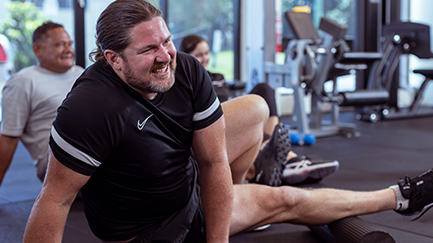
Supporting veterans through service related injuries
The Mates4Mates physical rehabilitation team is here to help veterans improve mobility, manage pain and enhance their overall wellbeing.

Domestic and Family Violence Prevention Month, held in May, aims to raise community awareness of the social and personal impacts of domestic and family violence and the support available to those affected.
Raising awareness ensures those experiencing domestic and family violence know how to access help and support and assists in encouraging people who perpetrate violence to take responsibility for their behaviour and seek support to change.
The unique nature of serving in the Defence Force can affect the formation of meaningful relationships. By understanding the difference between healthy and unhealthy relationships, this can assist with creating healthy patterns within our interpersonal connections.
So, what is a healthy relationship?
Firstly, it’s important to note that healthy relationships don’t just relate to romantic relationships but to any interpersonal relationship.
An interpersonal relationship can be between a person and their family members, friends, colleagues, club members, or even neighbours, and can include two or more people.
Healthy and unhealthy relationships can be compared by how those in an interpersonal relationship treat each other’s individuality, respect, equality, and consent.
Here are some examples of how healthy and unhealthy relationships differ.
Healthy Relationships:
Unhealthy Relationships:
How this can affect veterans and their families
Military life is vastly different to civilian life, and as such people within the Defence and veteran community can often struggle with creating meaningful relationships and effectively communicating with others.
There are several reasons for this, such as psychological factors stemming from length of time spent in service, or time away from home due to deployment or postings adding enormous pressure to relationships.
These factors can impact on family and other relationships, and it might be necessary to seek additional supports from mental health professionals or other organisations to develop skills to support the development and maintenance of health relationships.
Tips for creating healthy relationships
1. Recognise dysfunctional, toxic, and harmful behaviour. The first step is always to identify the difference between acceptable and unacceptable behaviour and the impacts of these behaviours on your relationships.
2. Understand why you’re stuck in a cycle of unhealthy relationships. Whether it stems from your own experiences or those of other individuals, recognising the patterns that have a role in negative situations can help you to seek support and make appropriate changes in unhealthy relationships.
3. Heal underlying trauma. There are many support systems in place for the Defence community, including programs and therapy sessions at Mates4Mates. Finding the right one for you and allowing people to help you is a huge step forward in creating new practices and developing appropriate responses.
4. Learn and practice new relationship skills, advised by qualified experts. It may take some time to find new practices that work for you but there are many useful skills that can assist in creating positive situations that help the development of healthy relationships.
Some of these include assertive communication, including ‘I’ statements, negotiation skills, recognising unhelpful thinking, being able to control self and behaviours, or recognising that you may need to take a time out to choose alternative behaviours that you may not have used previously.
5. Be willing to be alone rather than in a dysfunctional relationship. Prioritising yourself and your needs is something many people struggle with but doing so can also have a positive impact on the development of healthy connections and maintaining appropriate personal boundaries.
6. Treat others the way you want to be treated. It’s one you’ve probably heard before, but this simple method is also incredibly effective. Whether it’s knowing your boundaries and therefore respecting others or treating people with the kindness you wish to receive, working on empathy builds positivity. This also includes treating yourself with self-compassion.
Support at Mates4Mates
Mates4Mates works hard to raise awareness for, educate, and support members of the Defence and veteran community and their families who are impacted by domestic and family violence.
Throughout this month, Mates4Mates has been delivering its Healthy Relationships Program to help veterans and family members better understand the difference between healthy and unhealthy interpersonal relationships.
Psychologists, counsellors and social workers are also available at Mates4Mates to provide a safe and supportive environment as well as offer information and referral pathways which can further support and facilitate positive outcomes for all who are impacted by domestic and family violence.
If you’re a veteran or family member and want to find out more about seeking help at Mates4Mates to deal with unhealthy behaviours present in your life, reach out to us on 1300 4 MATES for a confidential chat.
National Support
Written by Christine Brabrook, Social Worker

The Mates4Mates physical rehabilitation team is here to help veterans improve mobility, manage pain and enhance their overall wellbeing.